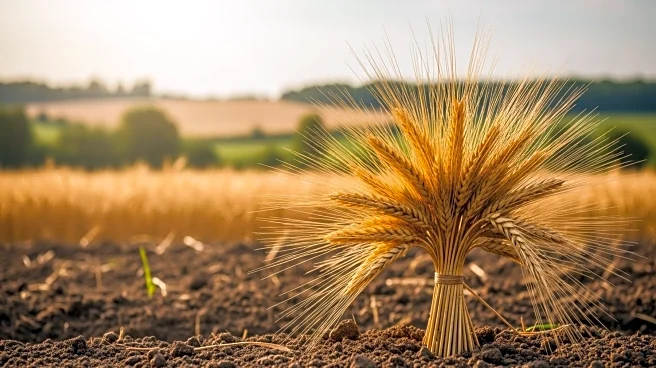What's Happening?
Prime Minister Narendra Modi has unveiled two significant agricultural initiatives aimed at boosting India's rural economy and achieving self-reliance in agriculture. The PM Dhan-Dhaanya Krishi Yojana and the Dalhan Aatmanirbharta Mission, with a combined budget of ₹35,440 crore, were announced at the Indian Agricultural Research Institute in New Delhi. These initiatives are designed to empower farmers, promote innovation, and ensure long-term food and nutritional security. The PM Dhan-Dhaanya Krishi Yojana, with an allocation of ₹24,000 crore, will integrate 36 government schemes to cover 100 aspirational agricultural districts, focusing on productivity, sustainability, and market access. The Dalhan Aatmanirbharta Mission, with a budget of ₹11,440 crore, aims to expand pulse cultivation by 35 lakh hectares, benefiting nearly two crore pulse farmers and reducing dependence on imports.
Why It's Important?
These reforms are crucial for enhancing India's agricultural productivity and self-reliance, which are vital for the country's economic growth and food security. By integrating various government schemes and focusing on local innovation, the PM Dhan-Dhaanya Krishi Yojana aims to improve agricultural practices and market access, potentially increasing farmers' incomes. The Dalhan Aatmanirbharta Mission seeks to boost pulse production, which is essential for nutritional security and reducing import dependency. These initiatives reflect a broader strategy to transform rural areas through technology, sustainability, and inclusive growth, potentially leading to increased participation of women in agriculture and improved livelihoods for millions of farmers.
What's Next?
The successful implementation of these initiatives will require coordination across various government departments and active participation from local communities. District-level plans will be tailored to local conditions, emphasizing productivity and sustainability. The government will likely monitor the progress of these schemes closely, ensuring that the intended benefits reach the targeted districts and farmers. As these initiatives unfold, stakeholders such as agricultural businesses, local governments, and civil society groups may play a role in supporting and enhancing the impact of these reforms.
Beyond the Headlines
The focus on empowering women in agriculture through initiatives like Namo Drone Didis and Krishi Sakhis highlights the social dimension of these reforms. By promoting natural and eco-friendly agricultural practices, these initiatives could lead to long-term environmental benefits and sustainable farming methods. The emphasis on export-led growth suggests a strategic shift towards making Indian agriculture competitive on a global scale, potentially opening new markets for Indian farmers.











